This is a huge topic and not everything that is contained in this article can be applied to everyone. Some tips are given and may be modified to fit

your particular need or situation. This article is written to help dog people choose a best friend that will have minimal issues, fit more comfortably into the human “pack,” and aid training efforts. It comes largely from the angle of temperament, but health must also be considered.
As a general rule, people should not pick a dog that has more energy than they themselves have. That is, most seniors will not do well with a hyper or stubborn dog, a dog that needs an hour of vigorous exercise each day, or a dog that requires high maintenance. Younger people will probably not do well with the “couch potato” breeds.
The size of the dog may figure into the picture as well. Will your apartment accommodate that Newf? Will your need of protection be met by a Yorkie? Can you lift the 80 lb. dog into the car for the Vet appointment?
As a general rule, look for a puppy/dog that is confident with you and his surroundings. A confident puppy/dog (no matter the age – typically a shy pup at 7 weeks of age will be a shy pup at 7 years of age) will have less tendency towards aggression, separation anxiety, and other maladies than wreak havoc in a home with a pet. Some confident dogs, however, may try to be dominant in the home. Therefore a more timid animal may be the right choice for those who have no desire for dominance issues. A word to the wise: dominance issues are easier to fix than fear/shy issues, contrary to public perception.
Of course, look for a dog that is healthy. He needs to have nice a looking coat, clear eyes, clean ears, no nasal discharge, be current on vaccinations, and preferably wormed within the last few months.
Those who despise housetraining will want to obtain a dog that hasn’t been raised solely on concrete or other hard flooring (linoleum, laminate, tile). This tends to teach the pup/dog that messing on a hard floor is perfectly normal: the kitchen, bathroom, hardwood living room floor are perfectly good places to relieve himself. Dogs that have been given ample opportunity to relieve themselves outdoors soon learn that outdoors is the only place to relieve themselves. There are exceptions to this point, but definitely a point to consider.
Rule #1 in choosing a dog: it is recommended you don’t pick a puppy or dog simply because “she was the cutest one.” Many people get so involved in the beauty or color of the puppy that they begin to overlook many behavioral issues. Many times they end up with a beauty that acts like a beast. Americans love beauty, and some will get it at all costs. But just be sure that the good-looking dog also has the temperament qualities that you’re looking for. If not, you’d better move on to the next pup.
For those with patience and some training no-how, adopting an older dog from the Shelter may be an option. Their chances of adoption have all but slipped away. Yes, some of them have issues but most do not. Some were surrendered because they barked at the neighbor’s cat (hello…dog’s bark. Don’t want a barking pet? Get a hamster!) Some Shelter dogs may have issues, but if you have the patience to work with them, it will be a rewarding experience. Some of these dogs who have been in the Shelter for years deserve an opportunity to live out the rest of their lives as someone’s friend. If this is a fit for you, give it a try.
As stated earlier, the points in this article may need to be adjusted to fit your particular need or situation. Use it as a general guideline. And…happy hunting for that just-right four-footed friend.

